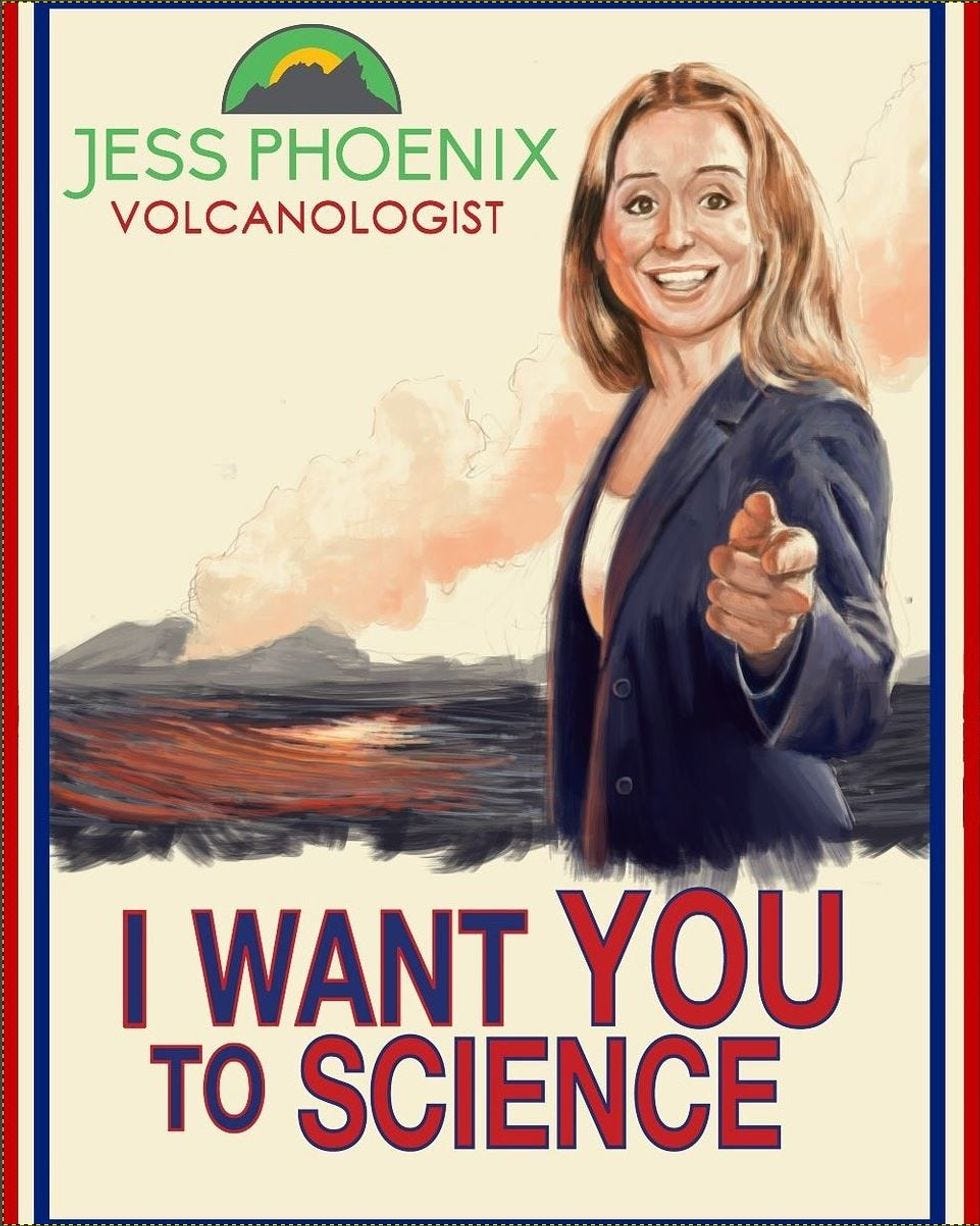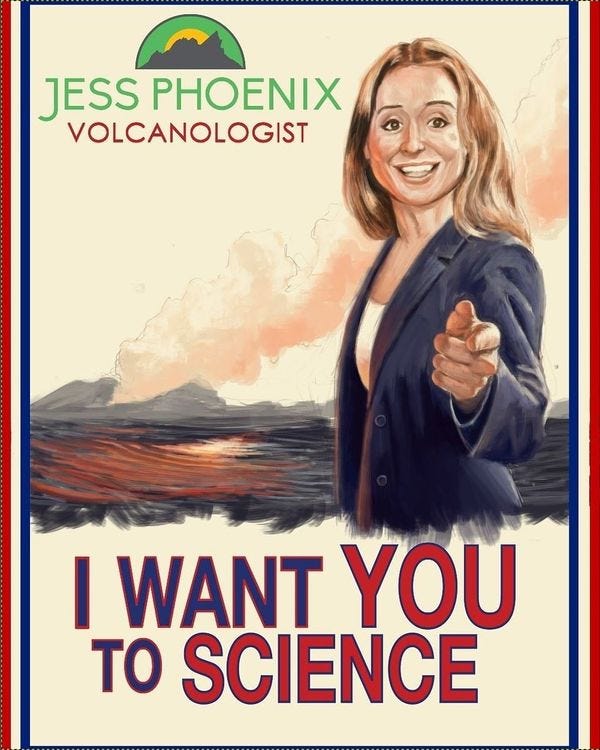20 Questions With Jess Phoenix, Actual Damn Scientist
Back off, man. I'm a VOLCANO scientist.
I had the privilege of interviewing Jess Phoenix, the politically active volcano scientist who I mentioned to you in this AMAZING piece of journalism. Read below and get her thoughts on science, politics and candy corn.
Wonkette: Being raised by FBI agent/conservative parents, did you start as a conservative or did you start more liberal?
Jess: I was more conservative by default. Growing up in Colorado, it was more conservative back then and I was like, "well my parents are Republican, so I guess I'm Republican. It changed pretty quickly when I turned 18 and went to college in Massachusetts!
Do you have a mentor or idol that inspired you early in life? Scientist? Politician?
J: Actually, oddly enough, it's in neither field. When I started in college I wanted to be a professor of modernist English poetry focusing on T.S. Eliot. I had a really fantastic English teacher in high school, Tom Hilbert, and he really brought literature alive and not just from the typical canon. He had us read Chicana and African literature. I credit him with instilling in me a willingness to explore, challenge myself and always be learning.
Why did you decide to run for Congress?
J: There's a couple of factors, but one of course, is Donald Trump being elected. He made a lot of promises that were also threats to certain groups of people and I'm worried about the future of science and evidence-based decisions in our country. So that, combined with the fact that my representative in this California district is Steve Knight, a climate science denier who has voted 98% with Trump, made me say, "this is a guy who isn't listening to his community." I thought that we need someone who will take the future of the district into account. Do we want to be known as a district who got left behind or do we want to be a green-tech hub? We have the infrastructure and the skill sets here that we could create a lot of green-tech jobs and this is something, environmental issues, that I have expertise in!
Will you run again?
J: I've said that I won't, and that's because I ran in reaction to a specific set of circumstances. I'm going to make myself accessible as a resource to folks who want to run for politics and aren't from that traditional old boys club background. While it may not be ME running again, I think we need to see more people LIKE me, who wouldn't normally choose to go into politics, but see it as a duty.
Do you think it's important to have more science literate government officials? Citizens?
J: Oh, ah let me just say a resounding, "hell yes!" Just in the last couple of days, there's a really badly done, completely false article making the rounds on Facebook that says that Yellowstone's [volcano[ threat level has been raised to high. That's not true! Yellowstone is 21st on the list of active, hazardous volcanoes in the country. The threat level has not changed and it's not likely to erupt in any of our lifetimes. Explaining the difference to people between a potentially cataclysmic volcano that only erupts every million years versus a volcano near a populated area, and could harm a lot of people, like Mount Rainier, is important. If you're neglecting earth sciences or biological sciences, well, you end up with people that don't understand how vaccines work. We can't be teaching intelligent design and creationism in public classrooms.
What worries do you have about the Trump administration and the state of science in this country?
J: The rejection of science is what troubles me the most. It's so pervasive and impacts so many aspects of policymaking. For example, HHS wants to exclude transgender people from legal recognition and protection. Science has shown that gender is not binary and neither is sex and we have scientific evidence for that. There's been efforts by scientists to push back, but we need the public to push back and demand evidence-based policy making. That's something that should be non-partisan.
What are your top three issues that worry you about the world today?
J: Climate change is the number one and that's because it's a threat multiplier and it's the greatest national security threat that we'll see in our lifetime. Everything else that we argue about will be irrelevant if we don't have a healthy planet where we can live.
Secondary from that, I'm really concerned about food security and health. To deal with this growing population we need to be more efficient with food production and that our health care system is top notch.
You are on the front lines of climate change. Do you think it's practically, if not theoretically, too late to reverse it?
J: With current technology, ameliorating is our best bet. However, I'm always an optimist fundamentally and I've seen the remarkable ability we have as a species to innovate. Government-backed local initiatives were able to stop the Dust Bowl from becoming more destructive than it would have been otherwise. I think that's a really good lesson for us in the power of coordinated efforts. I think we can stop the runaway warming effect to the point where it's at a level we can adapt to, but my bigger fear there is how many lives are we going to lose in the process.
Supervolcanoes. Worry level? Is this like juggling chainsaws after four Jagermeisters or more like smallpox in a caravan of Central American refugees?
J: Yeah, it's more like the latter. Supervolcanoes erupt very infrequently in the human time scale. I don't worry about them at all actually. In fact my husband and I are going on vacation to Santorini , Greece, which is a supervolcano.
The most dangerous volcano in the United States is actually Kilauea in Hawaii.
Do you have a favorite volcano? It's okay if it's Popocatepetl.
J: I have not actually visited Popocatepetl, but I would love to!
My favorite volcano is really hard to say, because there are so many and I love all of them, but for sheer destructive potential that we might see in our lifetime it's Mount Rainier.
If you were not a volcano scientist, what would you do instead?
J: As it turns out, I have an undergraduate history degree so if I couldn't do geology for some reason I'd probably be a historian and maybe nowadays, political history.
What's your ideal situation regarding hosting a science show?
J: I would like to reach as many people as possible. I really don't know what the most effective way of doing that is. Maybe it's a combination of a show and then also Facebook Live and YouTube stuff. It could be like Anthony Bourdain but for science but also with a mix of Steve Irwin. That's kind of me in both ways. I'm endlessly interested in people and culture and it plays a big role in science.
What advice would you give high school students interested in a career in science?
J: Learn as much as they can through any way they can do it. Keep learning and keep asking questions. The number one thing is to put out into the world what you're interested in. Share your passions and your curiosity with others. Say, if your thing is bumblebees. You never know, someone you meet might say, "Oh, you know what? My cousin is a bumblebee researcher in Georgia! I'll put you in touch with her."
Any different advice for girls?
J: Oh, yes. Don't ever think that what you're going to ask is stupid. Take the lead in being kind to yourself and encouraging yourself. Because you can be your biggest cheerleader. No one else will do it for you.
Your campaign was endorsed by two Star Trek Voyager actors and one Star Trek Enterprise actor. Now for the hard question. Star Trek the original series or Star Trek the Next Generation?
J: Ah! That's a really tough one. I really love the original series for the classic value and you can't beat Spock … but now I actually know some of the actors from the original series, which is super cool! So it gives it a bit of an edge.
And now for the hard hitting stuff. I understand if you hang up. Star Wars or Star Trek?
J: Oh, Star Trek ALL THE WAY, and I get a lot of grief, but I'm good with it.
As I found out, your husband is named Carlos. Great name, by the way. What does even Carlos not know about you?
J: The third CD I bought was John Cougar Melloncamp's "Dance Naked."
What's the first concert you went to?
J: I was actually that "caller nine" and won tickets to see the Offspring right before their Americana album came out.
What's the last book you read?
J: Can I tell you the one I'm currently reading? It's not light reading. It's called " The Unwinding: an Inner History of the New America ," by George Packer. It's non-fiction and it covers how we got to where we are now. It's a really fascinating book.
Last question. Candy corn. Delicious or good for throwing at your cat?
J: I think I vote "both" on this one. Sometimes I really want it, but then I need it and then regret my choices. I'm the candy corn mediator between my friends who are rabidly pro candy corn and rabidly anti candy corn. I guess it's the one example, today in America where you can say "there are very fine people on both sides" and you aren't talking about Nazis.
Closing thoughts?
J: For people who think that politics is too confusing or not their thing, just find an issue that you care about and try to get active in some way. Donate to an organization, volunteer your time or go out and knock on doors for that cause. Just do something, because by connecting with other people that care about what we care about, that's how we'll have a healthier and better society.

Wonkette is ad-free and funded ONLY by YOU. Money, please?



So what sign are you?
If any thought whatsoever is applied, the God squad and the deniers lose and lose badly.